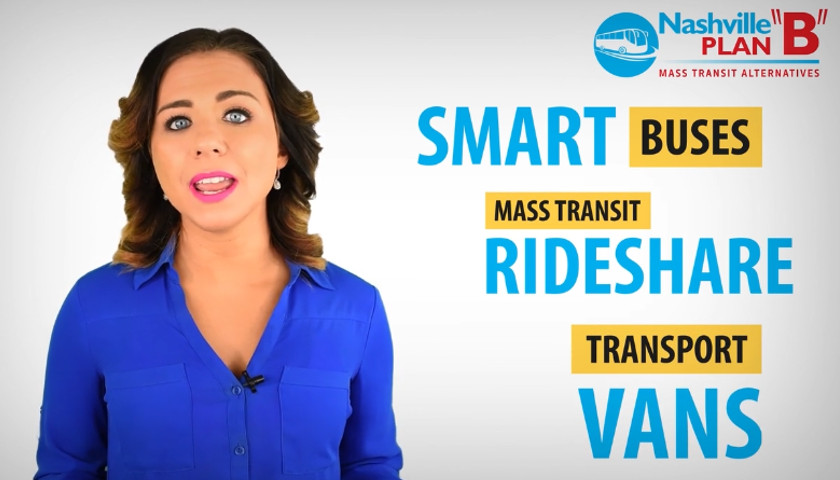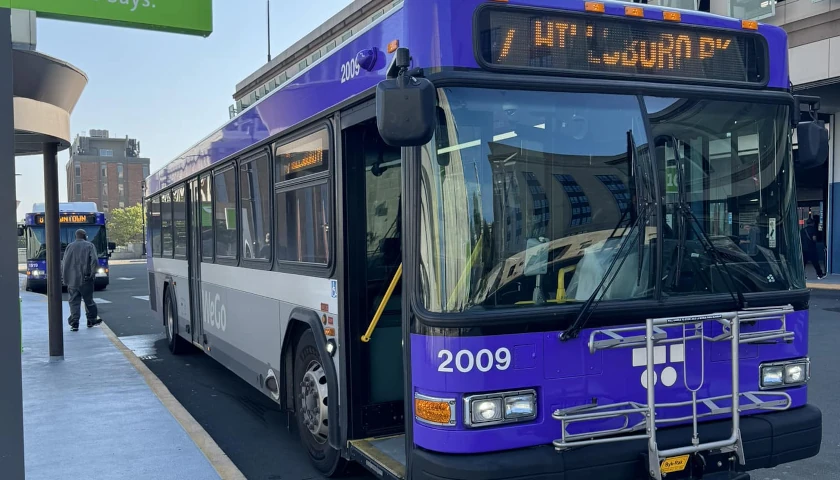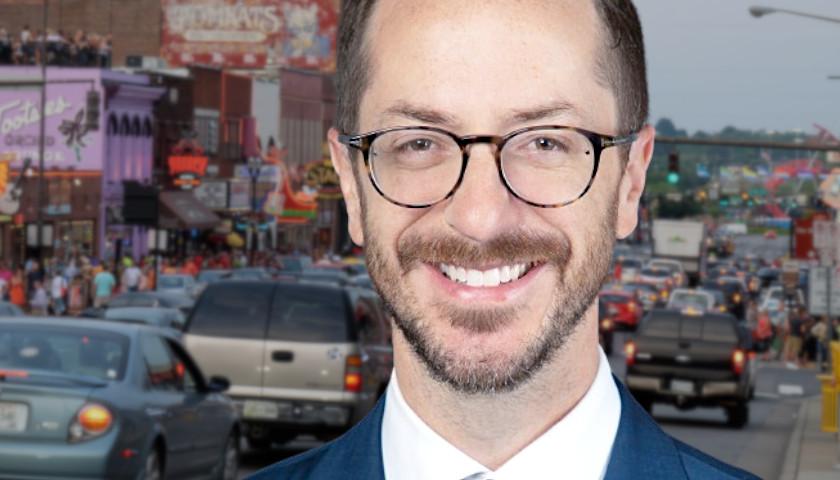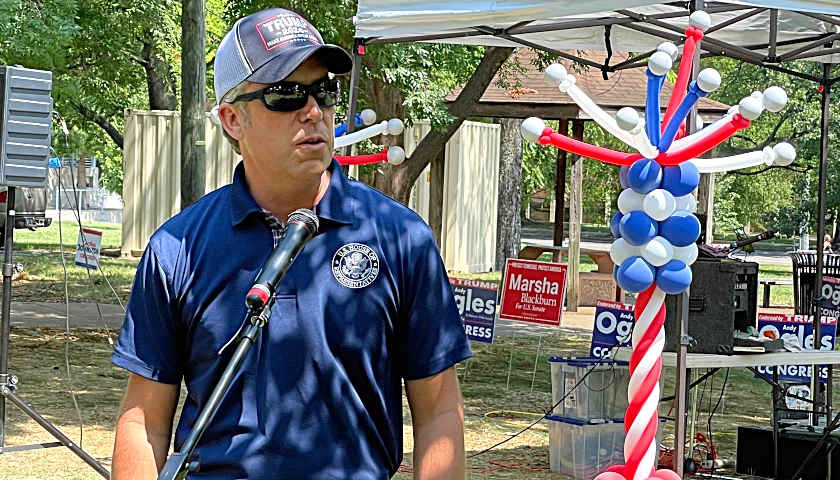Former Nashville Mayor Megan Barry loudly proclaimed “There is no Plan B” to her $9 billion Let’s Move Nashville transit plan.
It turns out she was wrong.
A new voice has entered the transit debate that focuses entirely on mass transit alternatives.
The group is calling itself Nashville Plan “B.”
The tagline for the website declares, “We aren’t against mass transit. Just this plan.”
Nashville residents John Maddox and Johann Porisch are two of the voices behind the Nashville Plan “B” Alternatives.
Porisch, a public relations professional, burst on to the scene during the Resign Now! Megan Barry Rally where he introduced his effort to organize a recall election to replace Mayor Barry, now moot with Barry’s resignation March 6.
Nashville Plan “B” joins the first group against the $9 billion Let’s Move Nashville plan, No Tax 4 Tracks, which launched two months ago with the headline that paying for the $9 billion transit plan would raise Nashville’s sales tax to the highest in any major U.S. city. The effort to defeat the plan on May 1 was then joined, as reported in the The Tennessee Star, by the grassroots movement Better Transit 4 Nashville.
Proponents of the $9 billion Let’s Move Nashville Plan have been critical of opponents of the plan for just saying no to the plan without offering alternative solutions. That has now changed with the launch of Nashville Plan “B,” which is focused on alternatives primarily to the high-cost light rail portion of the Let’s Move Nashville plan.
The first alternative Nashville Plan “B” cites is rideshare mass transit utilizing modern carpooling technology that would provide nearly door-to-door service, picking up a rider in their own neighborhood and dropping them at or near their job.
Nashville Plan “B” asserts that over an 8 hour day, 100,000 passengers could be transported via 1,000 leased vans at a fractional cost of $40 million.
As a point of reference, Plan B calls out an MIT study that just 2,000 ten-passenger vans using rideshare technology could replace 95 percent of the taxis in New York City, where the population is 10 times greater than that of Nashville.
Rideshare options with the pick-up and drop-off at or close to traveler’s destination addresses the “first and last mile” challenge even proponents of light rail recognize as very real.
Stacked highways is a second alternative offered by Nashville Plan “B,” and is one that Cato Institute’s Randal O’Toole introduced at the Beacon Center’s “What’s Wrong with the Nashville Plan” event in January.
O’Toole, a Senior Fellow working on transportation issues for decades, said that for significantly less than the cost of just the light rail portion of the Let’s Move Nashville plan, double-decker highways could be constructed for the entire 219 lane miles of “freeways” in and around Nashville.
The third option Nashville Plan “B” promotes is a smart bus system that, by utilizing tracking technology and real-time data analysis, gives the ability to increase and decrease route availability on demand. Nashville Plan “B” points to Indianapolis, where their highly-rated massed transit system operates at a cost of about $100 million per year.
Of course, Nashville Plan ”B” also points to the problems with the light rail portion of the $9 billion Let’s Move Nashville plan:
- The light rail will take up two travel lanes on five of the major roadways in Nashville, closing half of the lanes to drivers, which will result in more, not less, congestion.
- The proposed five light rail corridors will end four to five miles from the county line, which will fail to meet regional commuter congestion.
- Most people don’t live close enough to the rail lines to justify using it.
- At an average top speed of 18 to 20 miles per hour, plus numerous stops in between, light rail will not prove to be faster.
- The light rail system is inflexible and cannot account for inevitable changes in demand, especially in light of Nashville’s rapid growth.
- Light rail projects in many cities similar to Nashville have suffered declining ridership, significant budget shortfalls and construction cost overruns.
Nashville Plan “B” does encourage that Nashville residents “Vote No on May 1st” so that “We have a chance to consider Plan B.”
In stark contrast to Let’s Move Nashville proponents who claim that theirs is the only plan, Nashville Plan “B” doesn’t claim to have all the answers and, in fact, promotes that there are other Plan B’s to consider.
Reacting to the Let’s Move Nashville it’s-this-plan-or-nothing tactics and voting for the plan, Nashville Plan “B” says “for the sake of ‘just doing something’ is not the answer to a problem that will affect our city for generations to come.”






Face the facts. ALL public funded mass transportation loses money. It is just a convenient method for pretending to address problems while transferring benefits to the inner city folks in order to buy their votes.
This whole “mass transit” garbage is a scam from the get go. Mostly it is caused by inflexixble employers, poor infrastructure planning by city Govt for decades and people who work far away from home who then complain because of the choice THEY made and want the rest of us to solve their problems with our money. That being said, this isnt a bad idea and light years better than that idiotic boondoggle transit plam
“Plan B” is a GREAT starting point for a true open dialog and investigation into a 21st century solution to Middle Tennessee’s transit challenges! Flexibility, expand/contract-ability, cost effectiveness, and user satisfaction should be the leading qualifiers in determining the characteristics of any new system! Only when these are the top attributes, will customers find value in it AND only then can the system actually reduce traffic congestion! Developer interests and political favors should NOT be part of this discussion!
Plan ‘A’ or plan ‘B’ doesn’t relieve the taxpayers. The Music City Star loses some $3M per year which Tennessee taxpayer have to make up!